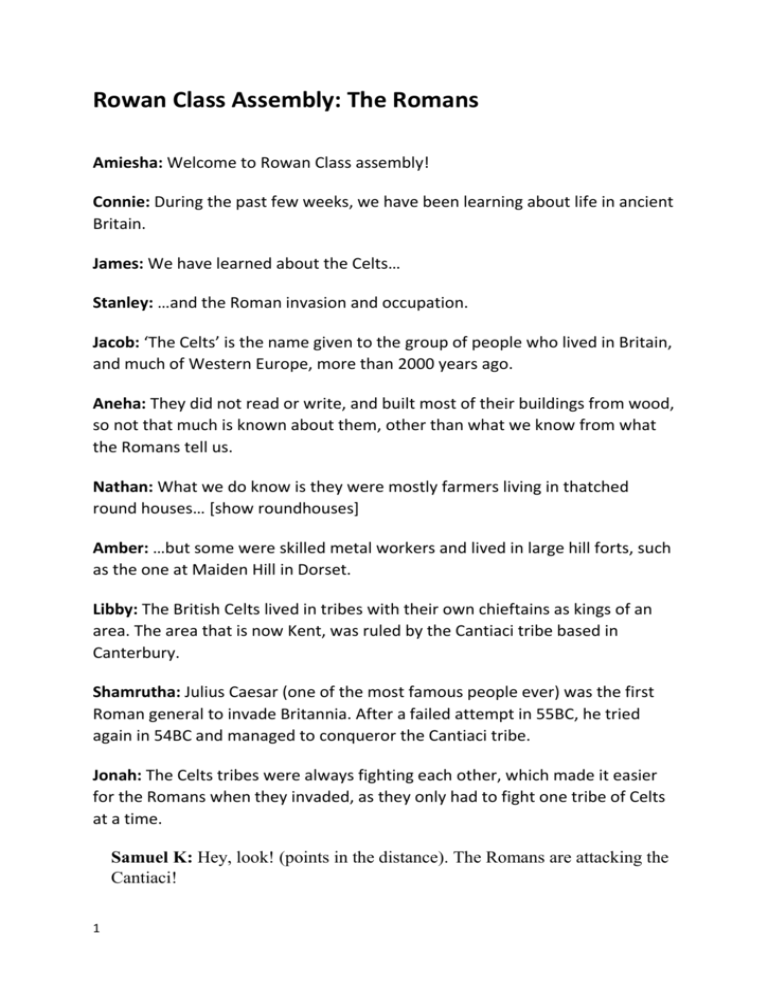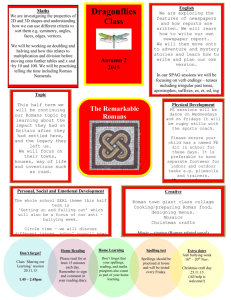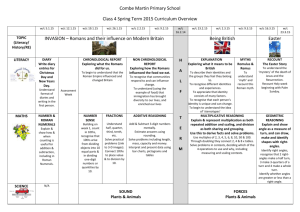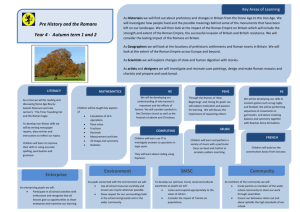Rowan Class Assembly
advertisement

Rowan Class Assembly: The Romans Amiesha: Welcome to Rowan Class assembly! Connie: During the past few weeks, we have been learning about life in ancient Britain. James: We have learned about the Celts… Stanley: …and the Roman invasion and occupation. Jacob: ‘The Celts’ is the name given to the group of people who lived in Britain, and much of Western Europe, more than 2000 years ago. Aneha: They did not read or write, and built most of their buildings from wood, so not that much is known about them, other than what we know from what the Romans tell us. Nathan: What we do know is they were mostly farmers living in thatched round houses… [show roundhouses] Amber: …but some were skilled metal workers and lived in large hill forts, such as the one at Maiden Hill in Dorset. Libby: The British Celts lived in tribes with their own chieftains as kings of an area. The area that is now Kent, was ruled by the Cantiaci tribe based in Canterbury. Shamrutha: Julius Caesar (one of the most famous people ever) was the first Roman general to invade Britannia. After a failed attempt in 55BC, he tried again in 54BC and managed to conqueror the Cantiaci tribe. Jonah: The Celts tribes were always fighting each other, which made it easier for the Romans when they invaded, as they only had to fight one tribe of Celts at a time. Samuel K: Hey, look! (points in the distance). The Romans are attacking the Cantiaci! 1 Isabel: Wow (impressed)! Look at how organised the Roman legionaries are… they’re massacring the Cantiaci’s best warriors! (smiles) It serves them right. Samuel K: It’s a good job the Romans don’t want to take our land… do they?! (look at each other worriedly) Dylan: Luckily for the neighbouring Celt tribes, Julius Caesar was called back to Rome, his army went back to France, and the Romans were occupied elsewhere for almost a hundred years. Nola: But in 43AD, under the command of General Plautius they returned in force: Twenty thousand Roman legionaries supported by another twenty thousand auxiliary soldiers landed at Richborough near modern-day Margate! Molly: Once most of the fierce fighting in south-east England was over, Emperor Claudius arrived in England to take command. Britney: (pats Plautius on the back) Well done Plautius. Is it safe for me to take all the glory yet? Jake: (looks at the audience blankly, shrugs his shoulders, bows and walks off) Yes, Emperor Claudius… Frazer: The Romans slowly conquered the rest of England fighting each tribe one by one. Ella: If a tribe surrendered quickly, the Romans often let the Chieftain stay as King, as long as they agreed to pay lots of tax and do as the Romans said. Samuel W: One such tribe was the Iceni which was based in East Anglia near Norwich. King Prastagus was allowed to remain as their King, but in AD61, when he died, the Romans refused to let his daughter Boudicca take over: Lucia: (angrily) What do you mean I can’t be Chief! It’s because I’m a girl, isn’t it! Well, I’m not putting up with this… You Romans will find out that there’s no messing with us British girls! Nina: Boudicca was a good as her word and led an uprising against Roman rule. The Iceni destroyed the Roman towns of Colchester, London and St Albans and 2 were joined by other Celt tribes who were fed up with the Romans being in charge. Tayma: The Romans hurriedly recalled their toughest legionaries back from Wales and the North of England and, thanks to the excellent roads they had built, were able to engage the Celt army in battle before they burned down any more Roman towns. Rishon: There was a massive battle at a place called Watling Street. A vast army of Celts, almost naked and painted in blue woad, outnumbered the Romans ten to one. The Celts were so sure they’d win they even invited their families to watch! Esra: Unfortunately for the Celts, the Roman soldiers were too tough and welltrained and managed to pull off a famous victory. Most of the Celts were killed, or taken prisoner and made to be slaves. Nell: Boudicca escaped from the battlefield, but knew she’d soon be caught. Lucia: It’s a total disaster… I’m not going to be a Roman slave, so I’m going to kill myself (drinks poison and falls to the floor). Nell: That was more or less the end of resistance to Roman rule in England, though some tribes of Celts still fought the Romans in Scotland and Wales. Oscar: Now that most of the land was peaceful, the Romans began to Romanise England. They built forts and grand public buildings all over the country linked together by a network of almost 2,000 miles of good quality Roman roads. Jake: They built temples to honour their gods, such as Jupiter, Saturn, Venus and Mars - and statues of Roman emperors were placed in villages. Bobby: Important Celts were encouraged to wear togas and learn Latin. Some built Roman style villas like the ones found near us at Crofton and Lullingstone. Ella: On our recent class trip to Crofton Villa we learned about how archaeologists have discovered so much about Roman lifestyles by carefully 3 digging-up and studying the things they left behind. We know so much about their buildings, what they ate and what their interests were. Rishon: We also had fun making mosaics, handling Roman artefacts and some of us had the opportunity to dress-up as Romans. [Show photos] Isabel: Here are some interesting facts about the Romans: Nola: The Romans ruled England for more than 350 years. Jonah: The Romans’ language ‘Latin’ has influenced the modern English language we speak today. James: Roman numerals are still used on many clocks. Samuel K: Much of the modern motorway network follows the same route as the roads made by the Romans?! Oscar: Roman’s liked to eat roasted dormice dipped in honey, and milkfattened slugs! Tayma: Big houses sometimes had a special room called a vomitarium especially for being sick in – I’m not surprised after eating so many slugs! Esra: Though most of England was settled under Roman control, in the far North of England and southern Scotland, the Romans kept being attacked by local tribes. Aneha: Emperor Hadrian decided to solve the problem by building a giant wall across the country. Roman soldiers from all parts of the Roman Empire were based at the wall. We know this because in 1973 archaeologists found hundreds of letters at Vindanola fort which give us an insight into a Roman soldiers’ daily life. Frazer: As you can imagine, there were a lot of requests for warm underwear, as few Romans were used to the cold northern winter! Molly: In class, we imagined we were Roman soldiers based at Hadrian’s wall and wrote our own letters using our knowledge of Roman Britain. 4 Read Letter 1 Read Letter 2 Shamrutha: Many generations of family grew up in England knowing nothing other than Roman rule, it would have seemed totally normal for them, but by the 5th Century the Roman Empire was being attacked by enemies from all sides. More and more Roman soldiers were withdrawn from Britain to fight enemies elsewhere. Jacob: Tribes from northern Europe and Scotland began to invade parts of Britain. In 410AD the Roman-British leaders sent a letter to Rome asking the Roman Emperor for more soldiers to help to chase the invaders away. Libby: To the Briton’s surprise, the Roman Emperor replied saying that the British would have to fend for themselves from now on. Most Romans soon left the country and, no longer protected from roaming invaders, ‘the dark ages’ began. Nina: We hope you have found our assembly interesting. Before we end, we’d like to sing you a song inspired by the Celt warriors’ love of the blue body paint woad. All sing ‘An ode to woad’ 5








